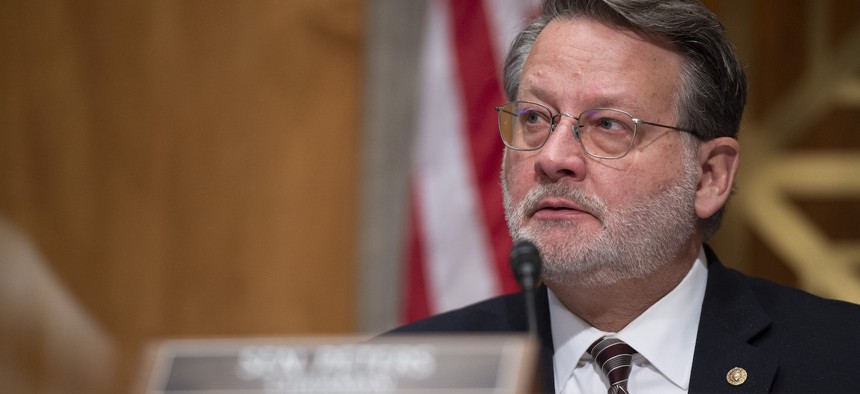
Sen. Gary Peters, D-Mich., is part of a bipartisan group of senators sponsoring legislation that seeks to improve customer service at federal agencies. Bonnie Cash/Getty Images
Senate lawmakers float plan to revamp agencies’ customer service
The Improving Government Services Act would require agencies to develop plans to implement private-sector customer experience best practices into how they interact with members of the public.
A bipartisan trio of senators hope to advance new legislation aimed at improving and “streamlining” federal agencies’ customer service across platforms, in part by adopting practices already employed in the private sector.
Customer service at agencies that interact with members of the public has been top of mind for lawmakers and administration officials in recent years. During the height of the COVID-19 pandemic, that attention was on electronic means like phone and the Internet, while over the last 18 months, the focus turned toward in-person service as well as backlogs that cropped up over the course of the pandemic.
The Improving Government Services Act (S. 2866), introduced by Sens. Gary Peters, D-Mich., James Lankford, R-Okla., and John Cornyn, R-Texas, last month but publicized Tuesday, tasks federal agencies that provide services to members of the public to develop annual customer experience action plans and submit them both to the director of the Office of Management and Budget and Congress. The Senate Homeland Security and Governmental Affairs Committee is slated to consider the bill next week.
Under the bill, the annual documents must propose strategies that adopt “human-centered” practices like outreach, assistance enrolling or navigating services, making forms easier to access and reducing administrative burdens. Agencies would also be expected to come up with ways to coordinate with each other to reduce the need for members of the public to interact with multiple agencies over a single service.
And they should look for ways to incorporate practices already adopted in the private sector, such as online services, call-back functions at call centers and better training for employees who provide customer service.
The bill would also require agencies to report to Congress about the average amount of time it takes a member of the public to receive a service, such as passports, veterans records, Social Security benefit determinations and the federal retirement process, all of which have been subject to backlogs in recent years. Plans formulated under the bill also would be expected to include information on plans to improve customer service for up to a decade.
“Taxpayers must be able to easily and efficiently reach federal agencies when they have questions about services or benefits,” Peters said in a statement Tuesday. “My commonsense bipartisan bill would require agencies to adopt customer service best practices that limit wait times and use callbacks to ensure taxpayers receive support in a timely manner.”
“I have worked for years across the aisle to get federal agencies to use private-sector best practices to improve customer service and promote privacy and data security,” Lankford said. “Some agencies have already successfully implemented private-sector best practices, but we need them government-wide.”
Indeed, some agencies have already begun work on ways to both improve their service delivery, as well as provide greater transparency for members of the public seeking assistance. The Office of Personnel Management earlier this year published a three-page guide to the federal retirement process, including frequently updated estimates of how long the process might take and tips to avoid mistakes that can delay the processing of a claim.







